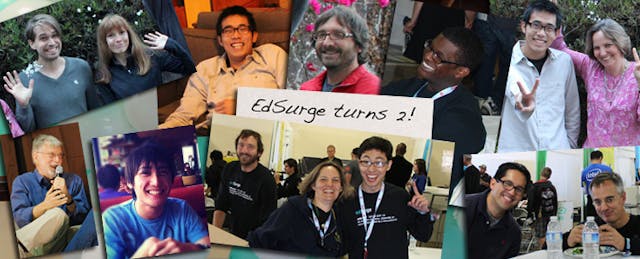What were you doing two years ago?
Back then, we wrote and shared our first EdSurge newsletter, optimistically numbering it "001." Back then, we couldn't even imagine writing issue number 10, much less 100. (We even flirted--and nixed--the idea of holding a few items back to make sure we had material for newsletter 002.)
In that first issue, we broke a story about a $90-million proposal by the Obama Administration for an "Arpa-Ed" program. We reported on an early edtech conference featuring some pitches by nascent companies. We heard Walter Isaacson, who was still working on his biography of Steve Jobs, say that Jobs told him that the "existence of [national] standards"--or really, Common Core--would make it possible for Apple to "get into" the education market.
To celebrate our birthday, we tossed a few questions into the ether: What were you doing two years ago? Who was your most memorable teacher? And of course, read a good book lately? Check out what some EdSurgents--including Joel Klein, John Danner, Esther Wojcicki, Adam Bellow, Lucy Gray, Dan Carroll, Heather Gilchrist and others--say here.
These days, we spend more time trying to trim information out of the newsletter than packing it all in (and many of you still tell us it's too long!) Arpa-Ed is still in the President's budget but not authorized by Congress. Google has made more strides in education than Apple, and seed-funded companies have sprung up like mushrooms. We've seen some mistakes--oops, call them pivots. We've seen a couple of guys take the money and split. (Oh, yeah. Sometimes the funders just take a sucker punch. Happily no educators were harmed.)
And we've seen--and cheered--the rise of the teacherpreneur and teacher activist: teachers articulating what tools they want to use in their classes and how they want to teach.
So what have we learned?
- We have great--and smart--readers. We are humbled by how many folks have corrected our spelling, our grammar, and every once in a while, our facts. Thank you! You've made us better reporters and writers by holding us to high standards.
- Our initial belief was that technology could help--but that it was not always "the answer." We've seen that point underscored many times by educators--and even recognized by entrepreneurs--in the past two years.
- Even so, entrepreneurs and educators are still learning to communicate with one another. It isn't easy: they speak different languages because the demands on them are very different. Teachers have to stand and deliver for every student, every day. Entrepreneurs are more comfortable stumbling around (or "iterating") as they try to hit a big target. Can these two work together? We remain optimists.
- DIY, 4ever. Learning to make your own stuff--whether it's an app, a robot, a company or a lesson plan--is education. Even Secretary Arne Duncan agrees. In an interview I did with him at Stanford University in September, he said:
"I don't think we do enough of…experiential learning around something you're interested in--a job shadowing, an internship, a mentorship, whether it's with a startup or a nonprofit. We should be giving our children access and opportunities to pursue their passions, even as early as middle school. And frankly, I'd probably spend less time in a traditional high school setting of the kind I went to when I was a kid."
- Never use profanities (particularly beginning with the letter "a") in headlines. It just makes people grind their teeth.
- Change will happen but both more slowly and quickly than you believe possible. That would describe two years of teetering right on the edge of our "zone of proximal development."
Imagining two years from now is just as hard as it was two years ago. (Tony wonders if we'll really close the newsletter before midnight--consistently, that is.)
Like most parents, I measure time by watching my boys' paths through school. But the schools themselves are changing, too. In two years, I hope that we'll see many more schools confidently using technology in ways that make a genuine contribution--to giving teachers more time, to supporting learning, to personalizing education.
How about you? Add your thoughts below, or to the comments by others here.
Thanks for helping create EdSurge. And hey, stick around. It's time to roll.


